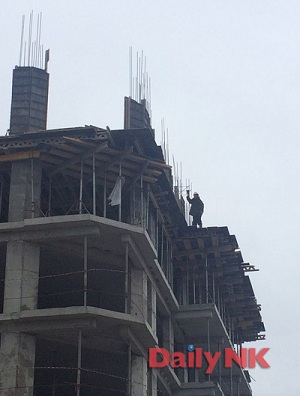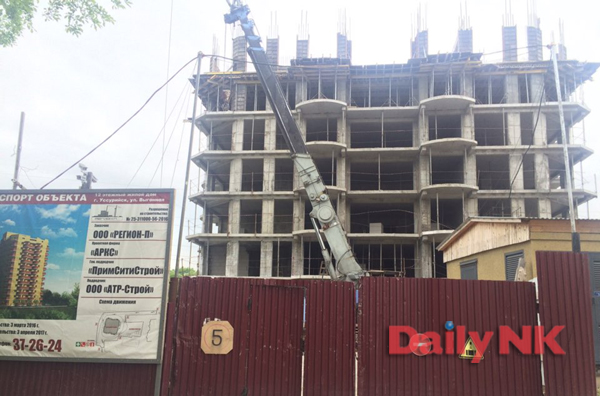In addition to a significant portion of their wages, North Korean laborers dispatched to construction sites in Russia are required to contribute up to $1,000 per month to the North Korean authorities. This forced monetary contribution, known as the “planning fund,” sees many laborers toiling up to 20 hours per day, as contributions amount to several times that of a worker’s monthly wages. In order to save up the requisite sum, the laborers are often forced to take on second jobs and forego a full night’s rest.
State-enterprise affiliated managers and cadres overseeing the operation are responsible for collecting and contributing a fixed amount back to North Korea. However, they exploit the workers by increasing the worker’s bribe amount when the economy is favorable or the laborers secure more work.
The average wage paid to overseas construction workers is $300 monthly. However, the monthly bribe that the laborers are forced to pay for the “planning fund” can be anywhere from hundreds to over a thousand dollars, compelling workers to search for ways to make up this difference. By day, they report to their designated work sites. By night, they head out alone or in groups to perform home repairs or other menial labor to procure the requisite bribe funds. As they are only allowed to keep the money that exceeds the bribe amount, they sometimes toil for more than 20 hours per day.
One North Korean construction dispatched to Russia’s Ussuriysk region told Daily NK, “I was required in April to contribute 60,000 rubles (~$950). Obviously, that means I had to earn the difference between my weekly salary and that amount through sidelines. Starting from about two weeks ago, if you add up the time I spent doing my state work and my side jobs, I was working roughly 22 hours per day.”
We asked if he found the planning fund costs prohibitive. “I don’t know,” he replied. “Whatever the Korean Workers’ Party asks for, I have to give.”
The worker continued, “Starting from about three years ago, those hoping to moonlight were under strict orders to work in pairs. They tried to get second jobs as painters or repairmen so that they could acquire enough money to pay into the planning fund and have some wages left over. However, things are different now. You can work alone and do whatever job is available. As long as you are paying your planning fee, there are few restrictions.”
When asked about the process of acquiring his second job, the worker said, “In order to get the contract job, I stayed up all night reciting and studying Russian. I also tried to learn a bit about wallpapering and painting. Those who want to work at night need to have certain skills. If you don’t develop these skills and moonlight at contract jobs, your debt will really start to pile up.”
This worker then introduced Daily NK reporters to an assistant at the construction site who spoke to the same point. “I saw one young worker who was really struggling. He was being worked into the ground and his teeth had nearly all fallen out. These workers put in 20 hour days, but some of them still struggle to send any money home to their families. Instead, they go into debt and fight bitterly to dig themselves out of financial strain. Those who can’t keep up with the payments eventually go broke and get repatriated.”
The planning fund contribution is set at a fixed amount by the North Korean authorities, but given the endemic embezzling by cadres in the middle, the bribe price can grow much larger. By way of example, if a given worker’s requisite contribution to the planning fund were $1,000, approximately half of that total would be wired to the authorities back in North Korea; the other half would be split up among the state enterprise cadres overseeing the operations abroad.
Citing a laborer in Russia’s Vladivostok region, another source said, “The bribe amount is set by the Party, but the managers in the middle set this at a higher amount so that they can pocket the difference. This happens in most scenarios. Some managers even make outrageous rules in order to squeeze more money out of the workers: adding a 500 ruble fine for having long hair, 500 rubles inappropriate clothing, 5000 rubles for ‘disturbing the peace,’ and 1000 rubles for wearing blue jeans, just to name a few.”
Bribes are even required to receive permission to engage in contract work, he said, noting, “The Party cadres have caught on to the fact that the managers are embezzling a sizable portion of the planning fund. The cycle of bribery is perpetuated when the Party cadres demand a piece of the action. This multi-level corruption is especially oppressive to the individuals at the bottom of the pyramid: that is, the laborers.”
While the lion’s share of a given laborer’s paycheck goes directly toward the planning fund, the remaining sum, while small, is still due to them. However, problems arise because a considerable amount of firms do not pay the wages until the end of the dispatch date. The managers at the firms sign a form confirming the dispersion of funds to the workers but, in reality, they hold on to the money until just before the workers return to North Korea. Likewise, holidays such as Kim Il Sung’s birthday and Party Foundation Day are used as excuses to withhold and embezzle wages.
According to a missionary contacted in the Khabarovsk region, there was an incident in Moscow two years prior in which a manager vowed to hold manage the laborers’ wages and distribute it in a lump sum prior upon completion of their stint abroad. Instead, he disappeared with the money. The financial impact on the six North Korean workers affected by the incident was enormous: the fruit of three years of their hard work evaporated in an instant. The infuriated workers complained through North Korean officials posted in Russia and, in an unprecedented move, were compensated.
The problem came in the wake of this incident. When the six workers returned to North Korea, they were arrested on charges of “disorderly behavior” for complaining about the manager to the North Korean representatives in Russia. In the end, they were all sent to a political prison camp.
Added the missionary, “I’ve met quite a few North Korean laborers during my time doing missionary work here in Russia. The interesting thing was that everyone knew about this incident. When I looked into it, I found out the in order to prevent organized resistance or further disturbances, the news about the ‘agitators being sent to a political prison camp’ was purposefully circulated. This was a threat designed to prevent copycat cases. The workers had no means to address any of their grievances. The situation was so grim that one worker committed suicide by lighting himself on fire, leaving behind a note that said, ‘I don’t blame anyone.'”
*This article has been brought to you with support from the Korea Press Foundation.



















